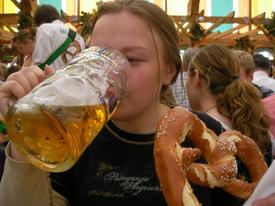Why are my apples not oxidisizng?

NYCNika
Posts: 611 Member
I cut an apple, leave it for 2 hours, and nothing.
That is just not natural.
I remember when I was a kid apples would turn brown in minutes.
They are "organic" apples too....
That is just not natural.
I remember when I was a kid apples would turn brown in minutes.
They are "organic" apples too....
0
Replies
-
could it be the metal of the blade you are using. Something pinged in the back of my mind one does not taint.0
-
Do you WANT them to oxidize? Why?0
-
What kind of apple? I have noticed that green, tart apples like Granny Simple don't brown as readily as the sweeter types.0
-
Because Monsanto.0
-
Very good for stomach upsets, brown apples. Obviously not too brown or you will end up with serious stomach upsets.0
-
Because Monsanto.
This,0 -
 0
0 -
High Vitamin C content inhibits the enzyme that causes apples to brown. What kind of apples are they?
Heat does too, if you're in a place that has a heat wave going right now.0 -

LOL0 -
(elicits an "LOL" from nolachick, and immediately turns to goo)LOL 0
0 -
Because Monsanto.
That's what I'm afraid of.
They are green on the outside apples. Apartment is air conditioned, so it is not too hot.0 -
Maybe your apples contain vitamin C, which is an antioxidant.0
-
All apples contain vitamin C.
Apples from "normal" sources (someone's garden) oxidize super fast. But store bought are just freaky.0 -
Because Monsanto.
That's what I'm afraid of.
They are green on the outside apples. Apartment is air conditioned, so it is not too hot.
Are they tart? (typically) the more acidic they are, the slower they will oxidize, but that's not always the case. Granny Smith apples, which are green, brown slower than almost every other kind of apple.0 -
Apples oxidize when the tighty whites are too tight....0
-
Because Monsanto.
This,
yep0 -
GMO products can not be certified organic. So not Monsanto.0
-
All apples contain vitamin C.
Apples from "normal" sources (someone's garden) oxidize super fast. But store bought are just freaky.
Isn't necessarily something in the apple--perhaps it is the conditions under which it was stored. I think the food warehouses all use a gas to retard spoilage (nitrogen, I think).0 -
I'm gonna vote for blaming leprechauns. It was definitely leprechauns.I cut an apple, leave it for 2 hours, and nothing.
That is just not natural.
I remember when I was a kid apples would turn brown in minutes.
They are "organic" apples too.... 0
0 -
first time i saw this i also got creeped out
i also see it in mcdonald's peeled apple slices, they can go days without browning up0 -
At the very least you could bother to learn what cultivar of apple you purchased.
There are hundreds of cultivars. Some will be more acidic than others. That acidity prevents them from browning.0 -
Shoot! I just ate an apple. And I ate it so fast I didn't check to see if it browned. I hope I don't pee glow in the dark now.0
-
They use citric acid to accomplish that. You can do it at home with a lime or lemon.i also see it in mcdonald's peeled apple slices, they can days without browning up0 -
Shoot! I just ate an apple. And I ate it so fast I didn't check to see if it browned. I hope I don't pee glow in the dark now.
I did once.
Monsanto.0 -
Shoot! I just ate an apple. And I ate it so fast I didn't check to see if it browned. I hope I don't pee glow in the dark now.
 0
0 -
That's what I was thinking. I'm not sure if there is any difference in how organic apples are treated but it's not exactly apple season in NY so they've likely been treated somehow.Isn't necessarily something in the apple--perhaps it is the conditions under which it was stored. I think the food warehouses all use a gas to retard spoilage (nitrogen, I think).0 -
That's what I was thinking. I'm not sure if there is any difference in how organic apples are treated but it's not exactly apple season in NY so they've likely been treated somehow.Isn't necessarily something in the apple--perhaps it is the conditions under which it was stored. I think the food warehouses all use a gas to retard spoilage (nitrogen, I think).
I suspect that is the answer. Apples, pears and other fruits continue respiration even after harvesting and if they take in oxygen, they spoil. If they are stored in nitrogen, they take in nitrogen, retarding spoilage. They would eventually spoil but it would likely be slowed down depending on how much nitrogen they absorb. Not sure how that would affect nutrition or flavor but I doubt that it would present a hazard.0 -
Apples can be stored for up a year before they're sold. Organic, whatever.
You're eating the last of last year's apple harvest right now.0 -
I think that when cutting an apple in half and leaving it out the limiting factor in it's rate of oxidation is the concentration of the enzyme polyphenol oxidase. Different varieties have different amounts. You can also affect the rate of oxidation with extremes of pH, temperature or by reducing the amount of oxygen present (covering in water for example).
I'd imagine apples that don't brown quickly are 'desirable' so modern cultivars are bred that have a lower enzyme concentration?
Try some other varieties of apples if it makes you feel better. I'm pretty sure my apples turn brown!
It's the same enzyme that makes tea and cocoa brown,0 -
You can't really breed apple trees. Cross any two apples and you get 10,000 different unique children that have almost no relation to their parents. So you have to just hope.0
This discussion has been closed.
Categories
- All Categories
- 1.4M Health, Wellness and Goals
- 398.4K Introduce Yourself
- 44.7K Getting Started
- 261K Health and Weight Loss
- 176.4K Food and Nutrition
- 47.7K Recipes
- 233K Fitness and Exercise
- 462 Sleep, Mindfulness and Overall Wellness
- 6.5K Goal: Maintaining Weight
- 8.7K Goal: Gaining Weight and Body Building
- 153.5K Motivation and Support
- 8.4K Challenges
- 1.4K Debate Club
- 96.5K Chit-Chat
- 2.6K Fun and Games
- 4.7K MyFitnessPal Information
- 17 News and Announcements
- 21 MyFitnessPal Academy
- 1.5K Feature Suggestions and Ideas
- 3.2K MyFitnessPal Tech Support Questions
















